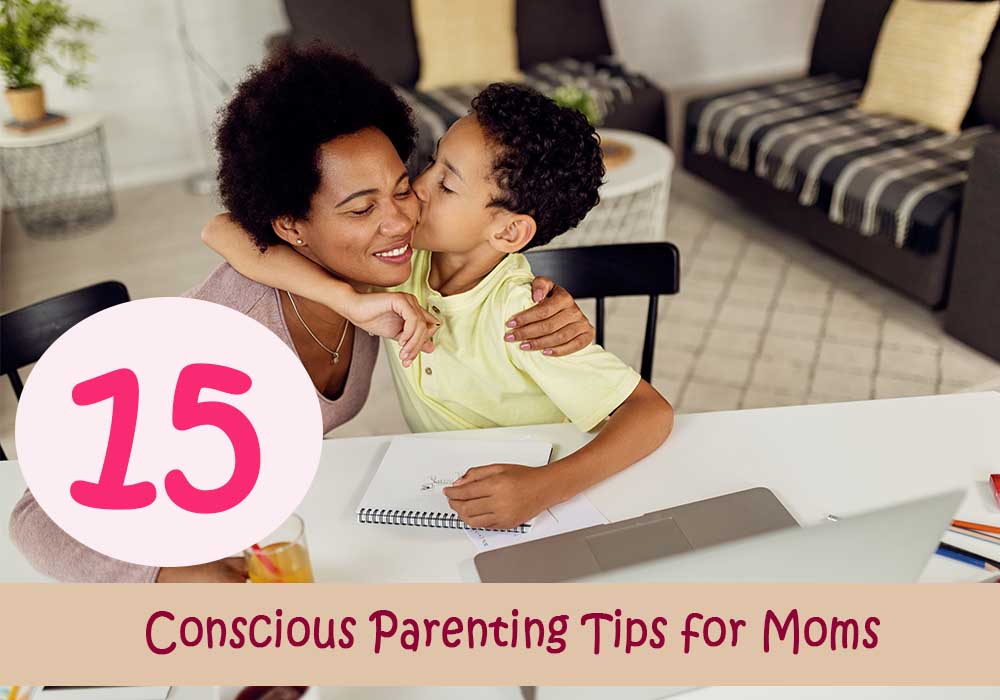Welcome to our in-depth manual on conscious parenting, a transforming strategy for bringing up kids in a loving, present-focused, and compassionate way.
In this post, we’ll talk about what conscious parenting is and why it’s so important for raising well-rounded kids. As mothers, we have a significant influence on how our kids turn out.
Therefore, adopting conscious parenting practices can open the door to a deeper and more bonded parent-child relationship.
So, let’s dive into the heart of conscious parenting and discover 15 valuable tips you can blend into your daily routine that will foster a nurturing environment where your children can flourish.
A conscious parent doesn’t look outside the parenting relationship for answers, but is confident the answers can be found for both parent and child within the parent-child dynamic.
Shefali Tsabary

What is Conscious Parenting?
Parenting with intention, mindfulness, and emotional awareness are all part of the theory and practice of conscious parenting. It entails putting your child’s needs first, being totally present, and developing an atmosphere of respect, empathy, and open communication.
In order to break away from unconscious tendencies that could impede the parent-child relationship, conscious parenting places a strong emphasis on recognizing and treating our emotional triggers and training.
The Importance of Conscious Parenting
Conscious parenting holds immense significance as it enables moms to develop a deep, empathetic bond with their children while guiding them through life’s challenges. By embracing conscious parenting as a mom, you:
1. Cultivate a Strong Emotional Connection:
Conscious parenting nurtures a strong emotional bond between moms and children. This leads to trust, security, and emotional well-being.
2. Promote Self-Awareness and Emotional Intelligence:
By portraying emotional intelligence, moms help their children to be interested and aware of their emotions and navigate them effectively.
3. Foster Independence and Autonomy:
Conscious parenting encourages moms to provide their children with the freedom to explore and make decisions which further promotes independence and self-confidence.
4. Instil Values and Morals:
By consciously practising good values and moral behaviour, moms shape their children’s ethical framework and guide them toward making positive choices.
5. Build Effective Communication Skills:
Through open, non-judgmental communication, moms create an environment where children feel safe to express themselves and develop healthy communication skills.
Now that we understand the essence of conscious parenting and its significance, let’s delve into 15 practical tips to help moms embrace conscious parenting in their everyday lives.
Read The Montessori Toy Rotation System [The Simple Mom Tips to Rotating Kids’ Toys]
15 Conscious Parenting Tips for Moms

1. Practice Self-Care:
Set self-care as a top priority to rejuvenate and be your best for your child. Remember that taking care of oneself is not selfishness; it is a crucial component of responsible parenting.
For your general well-being as a mom and to be able to give your child the greatest care possible, you must prioritize taking care of yourself. You may revitalize yourself and keep a balanced existence by taking good care of your physical, mental, and emotional needs.
Exercise, learning relaxation techniques, indulging in hobbies, or simply spending some time for yourself can all be considered forms of self-care. You can teach your child the value of self-care and self-love by modelling these behaviours for them by respecting your own needs and taking care of yourself.
Read Busy Mom Self-Care Tips [Discover 60 Amazing Self-Care Tips for Working Moms]
2. Be Present
Practice mindfulness and be fully present when interacting with your child. Engage in active listening, offering your undivided attention and genuine interest.
In today’s fast-paced world, it’s easy to get caught up in distractions and have divided attention. Being present means consciously focusing on the current moment and fully engaging with your child. When you spend quality time with your child, put away distractions like phones or other devices and give them your undivided attention.
Practice active listening by truly hearing and understanding what your child is expressing. Show genuine interest in their thoughts, feelings, and experiences. Being present in this way strengthens your connection with your child and helps them feel valued and heard.
Read Outdoor Activities with Toddlers [How to Facilitate your Toddler’s Development]
3. Embrace Empathy
Develop empathy by putting yourself in your child’s position and attempting to comprehend their thoughts and feelings. Empathy strengthens connection and emotional intelligence.
Empathy, which is the capacity to comprehend and share another person’s feelings, is essential to conscious parenting. You can understand your child’s viewpoint, feelings, and experiences by imagining yourself in their position.
With the help of this knowledge, you can react sympathetically and safely, fostering a loving environment. You can establish a deep emotional bond with your child and promote their emotional growth by validating their feelings and showing empathy. Empathy fosters your child’s emotional intelligence and aids in the development of their empathy skills.
4. Model Healthy Emotional Expression
Demonstrate healthy emotional expression by acknowledging and managing your emotions constructively. This sets a powerful example for your child to follow.
Children learn by observing their parents’ behaviours, including how they express and handle emotions. Modelling healthy emotional expression involves being aware of your own emotions and showing appropriate ways to express and manage them.
Instead of suppressing or dismissing your emotions, acknowledge them and communicate them calmly and in a respectful manner. By constructively expressing your feelings, you teach your child how to handle their emotions effectively, promoting emotional intelligence and healthy communication.
5. Set Clear and Consistent Boundaries
To give your child a sense of security and order, establish clear boundaries. Establishing limits consistently promotes predictability and trust.
For children, boundaries offer structure and direction, assisting them in comprehending expectations and navigating their environment. You provide your child with a sense of protection and security by establishing clear limits.
The key to setting these boundaries is consistency since it clarifies your expectations for your child and prevents confusion. Children gain a sense of trust and predictability when limits are continuously reinforced, which benefits both their general well-being and behaviour.
6. Encourage Independent Thinking
Encourage your child to investigate many viewpoints, decide, and find solutions on their own to challenges in order to develop their critical thinking abilities.
Your child can develop their ideas, views, and problem-solving abilities by encouraging autonomous thinking. Encourage them to consider various viewpoints, pose inquiries, and engage in critical thought about various circumstances.
Give children the flexibility to make age-appropriate decisions and to take responsibility for the results. Make sure they know that every decision has an effect.
By encouraging independent thought, you enable your child to develop into a self-assured and resourceful adult who can make thoughtful decisions and find solutions on their own.
7. Practice Positive Discipline
Move away from punitive discipline and embrace positive discipline strategies that focus on teaching, guiding, and understanding your child’s behaviour.
Positive discipline is an approach that focuses on teaching and guiding children rather than resorting to punishment. It involves understanding the underlying reasons for your child’s behaviour and constructively addressing those issues.
Positive discipline promotes conversation, problem-solving, and educational opportunities instead of adopting punitive methods like yelling or physical punishment. By employing positive discipline techniques, you can help your child and yourself establish a solid foundation of mutual respect, trust, and understanding.
Here is an article on How to Promote Positive Discipline in Your Home
8. Prioritize Connection Over Perfection
Strive for a genuine connection with your child rather than striving for perfection. Embrace the messiness of parenting and focus on building a loving relationship.
Parenting is not about being perfect; it’s about building a meaningful and loving relationship with your child. Instead of searching for perfection, prioritize connection and authenticity. Embrace the inevitable messiness and challenges of parenting as opportunities for growth and learning.
Focus on fostering a deep emotional connection with your child, nurturing open communication, and building a foundation of trust. When you prioritize connection over perfection, you create a safe and supportive environment where your child can thrive.
9. Promote Emotional Awareness
Labelling and talking about emotions will aid in your child’s development of emotional awareness. This gives individuals the power to manage their emotions skillfully.
Since it enables them to comprehend and control their own emotions, emotional awareness is an essential skill for kids to gain. Labelling various emotions and having open conversations about them will help your child.
Encourage them to communicate their emotions and give them permission to feel what they are feeling. By doing this, you provide children with the skills they need to effectively manage their emotions, empathize with others, and develop strong emotional intelligence.
10. Encourage Open Communication
Make a place where people can speak honestly and openly. Help your youngster express themselves without worrying about criticism or repercussions. A strong parent-child connection is built on honest and open communication.
Make a place that is free from judgment where your child can freely communicate their ideas, worries, and experiences. Encourage open communication between them by paying attention, demonstrating empathy, and validating their emotions.
Avoid using harsh words or downplaying their feelings because these actions can obstruct honest dialogue. Your youngster is more likely to voice their opinions and seek for help when necessary if they feel heard and understood.
11. Practice Active Problem-Solving:
By including them, you can teach your child how to solve problems. Finding solutions together encourages independence and critical thinking.
The ability to solve problems gives kids the confidence they need to face problems and discover answers. Encourage your child to develop concepts, weigh possibilities, and decide to get them involved in addressing problems.
Provide direction and encouragement as they experiment with various tactics. By working together, they can develop their independence, critical thinking, and sense of control over their decisions. Active problem-solving is a crucial ability that your child may use throughout their lives if you practice it with them.
12. Celebrate Individuality:
Accept and appreciate your child’s individuality. Promote their hobbies and passions so they can grow into their true selves.
Every child is different, with their own set of passions, skills, and character traits. Supporting their interests and passions will help you accept and cherish their uniqueness.
Encourage them to discover their skills, interests, and passions. Offer chances for creativity and self-expression. By encouraging children to be true to themselves, you aid in their development of identity and self-assurance.
13. Lead by Example:
Keep in mind that your behaviour speaks louder than your words. Be the person you want your child to become, and set an example for the attitudes and principles you want them to adopt.
Children pick up skills by seeing and copying their parents’ actions. As a mother, you have a significant influence on how your child develops. Be aware of the example you provide and attempt to exhibit the traits and values you desire your child to uphold.
In your contacts with others, serve as an example of kindness, respect, empathy, and integrity. Show them what it is to have self-control and kindness. By setting a good example, you give your child someone to aspire to.
14. Encourage Mindfulness Practices:
To foster inner peace and resilience, introduce age-appropriate mindfulness exercises like deep breathing, meditation, or gratitude exercises.
The promotion of inner peace, self-awareness, and resilience can help parents and kids alike. Introduce your child to age-appropriate mindfulness exercises like deep breathing techniques, guided meditation, or gratitude exercises.
These activities support their growth in emotional regulating abilities, stress reduction, and well-being cultivation. You may foster emotional balance and general mental health for both you and your child by introducing mindfulness into your everyday routine.
15. Practice Unconditional Love:
Shower your child with love and acceptance without conditions, letting them know that their worth is independent of their accomplishments or actions. – image
The cornerstone of a stable bond between parent and child is unconditional love. It entails unconditionally loving and accepting your child, regardless of their successes or failures. Tell your child that you love them for who they are as people, not what they have accomplished.
Clarify that you love them no matter what and that you appreciate and regard them for who they are. You may make a nurturing and encouraging environment where your child feels safe, loved, and accepted by practising unconditional love.
Read about Mom Guilt [All You Need to Know and 15 Ways to Deal with It]
Final Thoughts on Conscious Parenting
Conscious parenting is a powerful approach that enables moms to raise mindful, connected, and emotionally resilient children. By embracing the 15 conscious parenting tips discussed in this article, you can create a nurturing environment where your child can thrive.
Remember, conscious parenting is a journey that requires patience, self-reflection, and growth.
As you embark on this transformative path, cherish the precious moments with your child and celebrate the beauty of the parent-child bond.
FAQs about Conscious Parenting
1. What is the primary goal of conscious parenting?
The primary goal of conscious parenting is to cultivate a nurturing and authentic parent-child relationship, fostering emotional connection, empathy, and personal growth.
2. Is conscious parenting suitable for all parenting styles?
Yes, conscious parenting principles can apply to various parenting styles. It is adaptable and focuses on the quality of the parent-child relationship rather than sticking to a specific parenting method.
3. Can conscious parenting help improve a child’s behaviour?
Conscious parenting promotes understanding and addressing the root causes of behaviour rather than merely focusing on behaviour modification. By nurturing emotional connection and providing guidance, conscious parenting can positively impact a child’s behaviour.
4. Can I practise conscious parenting at any stage of my child’s life?
Absolutely! It is never too late to practise conscious parenting. The principles can be incorporated at any stage, and each small step counts toward building a more mindful and connected relationship.
5. How can conscious parenting benefit me as a mom?
Conscious parenting not only benefits your child but also enhances your personal growth as a mom. It promotes self-awareness, emotional intelligence, and mindfulness, ultimately leading to greater fulfilment in your parenting journey.
6. Are there any recommended resources to deepen my understanding of conscious parenting?
Yes! Here are a few recommended resources to delve deeper into conscious parenting:



